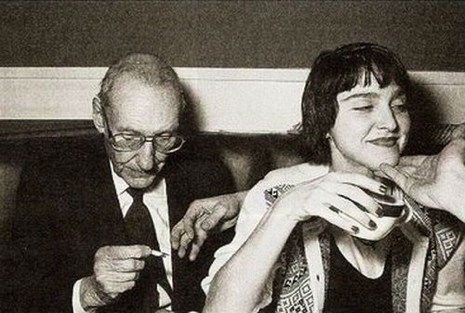
Above. Madonna and WIlliam Burroughs at his 70th birthday party at Limelight (not in the film).
The new documentary, Limelight; The Rise and Fall of New York’s Greatest Nightclub Empire, which opened this weekend, I thought, was a lost opportunity. Produced by Jen Gatien, the daughter of former Limelight owner and NY nightlife kingpin, Peter Gatien, and directed by Billy Corben, the film takes a “true crime story” approach and focuses too much on the details, giving the audience far, far too much information on legal machinations and the minutia of DEA procedures. They took a story that was positively teaming with sex, drugs and rock-n-roll and managed to turn it into fairly dry “he said, he said” kind of thing. It’s not much better than a standard a TV investigation, truth be told.
I suppose I should tell you that I worked at the Limelight for a little less than a year in 1985, so I’m bringing that to the table. If you actually care about the details, as I did, then it’s almost interesting, but by the end I’d had enough. My wife just hated it. For someone who never walked through the doors of the club, or who didn’t live in NYC between 1983 and 2002, there is very little to recommend Limelight.
Quizzically, there’s very, very little in the film about the crazy shit that actually went on at the Limelight. Unsurprisingly, since he is her father, Gatien and Corben’s film, concentrates on Peter Gatien, the enigmatic eye-patch wearing nightclub impresario who stayed on top of NYC nightlife for two decades before being hounded out of the country by bogus DEA harassment and the IRS. Instead of giving you any real sense of the “scene” he presided over in an opening montage or something, the film starts straight off the bat more or less as a biography of Gatien. He is an interesting character, don’t get me wrong, but there were so many other (much more) interesting characters running around his clubs that focusing too much on Gatien is a mistake (My own memory of Peter Gatien was that whenever he was around, no one ever said anything and he himself was a man of very few words. There was always an awkwardness—in others, not Peter—when he was in the room. I think he enjoyed being intimidating).
The club’s early success is glossed over in a matter of minutes. None of the characters I saw there frequently are even mentioned (Billy Idol and Duran Duran’s John Taylor deserved merit badges for committing courageous acts of decadence, let’s just say) and even Michael Alig’s dramatic downward spiral into drugs and then murder, is given comparatively short-shrift. Clearly, Gatien’s goal with the film is to exonerate her father’s reputation and on that level it does a fairly good job. Still, outside of the Gatien family, employees of Peter’s clubs, or people who frequented them, I can’t imagine this film will hold that much interest for a general audience.
Bonus anecdote: I could tell you one of hundreds of stories about Limelight and some of the things I saw there, but here is just one: It was 1985. It was late, maybe 2am when this occurred. I was 19-years-old (not old enough to drink or work there, obviously) and standing behind the front desk/coat check area. A very jolly Rod Stewart walked in with two women, one on each arm. The trio was feeling no pain, let’s say. An extremely drunk Wall Street guy saw them and in a very loud voice exclaimed “ROD STEWART! Hey man, I’m your biggest fan!” Stewart stopped, cocked an eyebrow and wryly regarded the drunk yuppie for a moment and then, stating the obvious, whistled “Fuck off, mate” through his teeth and they continued making their way into the club.
I know that sounds mean, but it was laugh out loud funny. “Fuck off, mate” was the only thing to say at that particular moment… Maybe you had to be there…